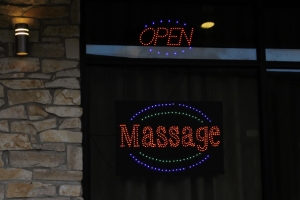Does NH need to license massage establishments?

For several years the New Hampshire Legislature has considered bills to license massage establishments, similar to how the state licenses nail salons and barbershops. At first glance this seems like many other licensing debates, with tension between public health and government overreach. A deeper look uncovers an ongoing discussion over how to fight human trafficking in the Granite State.
A proposal to license establishments, not just individuals
Massage therapists need to complete education and apply for a license to work in New Hampshire. However, there is no specific license for massage establishments that employ multiple massage therapists.
SB 212, a bill currently in the New Hampshire Senate, would require a license to operate an establishment where massage therapy services are offered by more than one person. (There is an exception for sole proprietors without employees.)
Right now it is difficult for the Office of Professional Licensure and Certification (OPLC) to investigate whether everyone offering a massage is licensed within a larger business. The OPLC has to wait for a complaint to investigate, and even then a massage establishment can throw up roadblocks. The OPLC has little power to shut them down.
At a recent public hearing for SB 212, a representative of the OPLC discussed how they receive several complaints a year about potentially unlicensed massage therapists using painful or inappropriate touch.
SB 212 would give OPLC the power to proactively inspect massage establishments and shut them down for violations.
Could this make business difficult for human traffickers?
A similar bill recently came up in the state House of Representatives, HB 341. The OPLC also testified there about the difficulty of investigating complaints, but most of the public hearing focused on a different issue: human trafficking through massage parlors.
Members of law enforcement and representatives of the New Hampshire Coalition Against Domestic and Sexual Violence testified about a troubling pattern of “illicit massage businesses” in New Hampshire. At these establishments, immigrant women who speak little or no English are controlled or coerced by their employers to offer sexual services alongside massage. These women may owe large debts to their employers, may not control their own finances, and may be told they will be arrested or persecuted if they leave the massage parlor. These elements of fear, coercion, and isolation make victims extremely reluctant to cooperate with law enforcement. This, in turn, makes it very difficult to prove human trafficking at these establishments.
Licensing massage establishments at the state level could make it more difficult to operate one of these illicit massage businesses because they would have to be more transparent about their operations. State licenses would also provide more of a paper trail for law enforcement to follow. Lastly, a state licensing process might help victim advocates identify and contact potential victims of human trafficking.
Or would it just make business difficult for everyone?
The officials and victim advocates who testified at the public hearing all had a similar message: we need to look outside the criminal justice system to combat human trafficking. Legislators, however, are not convinced business regulations are a suitable approach.
“It is unlikely that any massage establishments that are involved in sex trafficking would comply and apply for a license that requires these inspections,” wrote Rep. Matthew Santonastaso (R-Rindge). “They would either rebrand or simply not comply.”
Other representatives worried that the bill could put OPLC inspectors in unsafe situations.
Meanwhile many Republicans, including Gov. Sununu, want to streamline the entire OPLC and ease licensing requirements across occupations.
“I am very much concerned that we are putting restrictions on our small businesses in order to make it easier for law enforcement to target some of the bigger ones that are the bad apples,” said Rep. Carol McGuire (R-Epsom). She chaired the House committee that evaluated HB 341.
Next steps
In February the state House of Representatives killed HB 341 by a vote of 184 to 171. The Senate has yet to vote on SB 212, however, so the debate over licensing massage establishments continues.
If you have an opinion on SB 212 and massage business licensing, reach out to your elected officials. You can find who represents you on our Elected Officials page.
Update: SB 212 and HB 341 both failed to pass the legislature. Click here to explore the latest legislative proposals related to business licensing.











Comments
Login or register to post comments